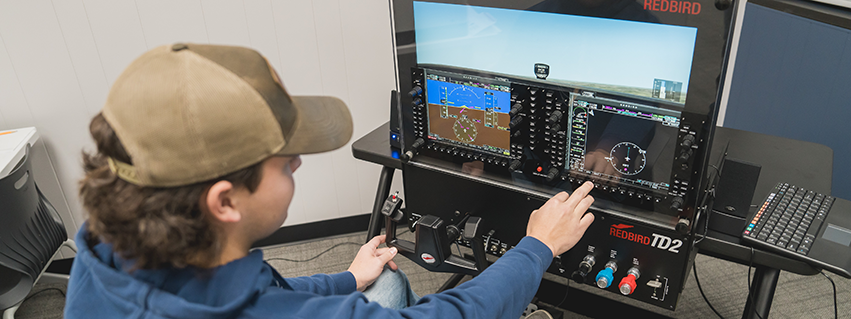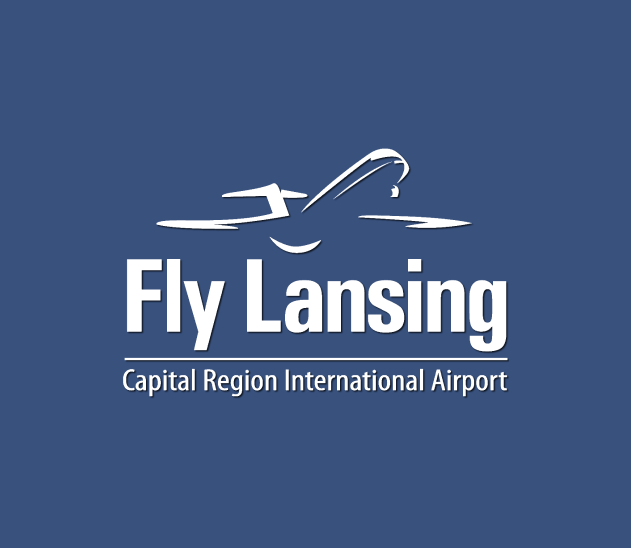
Aviation Careers Institute
The aviation industry is facing an unprecedented shortage of pilots, with an estimated 600,000 new pilots needed over the next 20 years. This great demand makes aviation a highly sought-after industry with great growth potential.
Eaton RESA, in partnership with the Capital Region International Airport, offers high school juniors and seniors in all school districts and academies in Eaton, Ingham, and Clinton counties the unique opportunity to learn about careers in aviation, take part in classroom lessons, and utilize flight simulators to learn the basics of flight, plane management and ground school. In addition, as school districts are not permitted to provide air flight instruction, students will be connected to flight school partners if they choose to begin flying lessons and work toward earning a pilot’s license.
A specialized loan program partnership with MSU Federal Credit Union (MSUFCU) has been developed for students in this program to assist with costs associated with flight lessons.
Program Overview
Course Information
Program Location
Capital Region International Airport (Shuttle Available)
Session Offered
AM/PM
Average Lecture Days/Weeks
4 days
Average Lab Days/Week
1 day
Homework
15-20 hours/week
Required Reading
- The Pilot’s Manual Ground School
- Pilot Handbook of Aeronautical Knowledge
- Airplane Flying Handbook
- Crosswinds Aviation DA-20 Training Manual
- Airman Knowledge Testing Supplement for Sport, Recreational, Remote and Private Pilot
Success Indicators
- High level of professionalism
- Personal responsibility
- Participation critical thinking skills
- Determination and dedication to learning
- Strong study skills
College Credits
- Up to 3 college credits at Eastern Michigan University
- Up to 4 college credits at Northern Michigan College
Academic Rigor
This is an applied science class. It includes technical reading, math and physics.
Capital Region Technical Early College (CRTEC)
None
Course Outcomes
Student learning outcomes include, but are not limited to:
- Aerodynamics
- Aircraft Mechanical Systems and Instrumentation
- Aircraft Performance Calculations
- Physiology
- Airport environment and communication requirements, Federal Aviation Administration (FFA) airspace systems
- Aeronautical charts and navigational calculations
- Time, speed, distance, and fuel calculations using E6B flight computer
- Aviation meteorology
- FFA regulations
- Aviation career exploration
- Introduction to aviation industrial workplace safety.
- Installation and repair of electrical, hydraulic, pneumatic and digital controls that operate Automated Mechanical and Robotic systems.
Certifications
- Transportation Security Administration Safety
- Endorsement to take FAA Private Pilot License Knowledge Exam (Requirements must be met)
- Remote Pilot Certification (2nd year students only)
Student Leadership
- Student led team-based learning, professional volunteer/community service opportunities.
- Second year students - take on CFI/Captain role in the classroom
Career Outlook
Careers
- Aircraft Mechanic & Service Technician
- Avionics Technician
- Pilot/Engineer
- Airfield Operations Specialist
- Air Traffic Controller
Median Wage
- Aircraft Mechanic & Service Technician: $36.07 Hourly, $75,020 Annually
- Avionics Technician: $37.22 Hourly, $77,420 Annually
- Pilot/Engineer: $219,140 Annually
- Airfield Operations Specialist: $24.59 Hourly, $51,140 Annually
- Air Traffic Controller: $66.05 Hourly, $137,380 Annually
Employment Outlook (Average)
- Aircraft Mechanic & Service Technician: 2-4%
- Avionics Technician: 2-4%
- Pilot’s/Engineer: 2-4%
- Airfield Operations Specialist: 5-8%
- Air Traffic Controller: 3%


